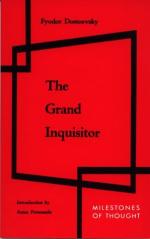|
This section contains 260 words (approx. 1 page at 400 words per page) |

|
1870s: Dostoevsky is part of a political movement in Russia calling for the establishment of a great Greek Orthodox Empire with Russia as its leader and Constantinople as its capital. Non- Orthodox Christians, particularly Roman Catholics, were considered heretics.
1990s: After a serious decline during the middle of the twentieth century, the Russian Orthodox Church has regained its position as the most important of the Eastern Orthodox Churches. Since 1962, the Eastern Orthodox and Roman Catholic Churches have had free dialogue as equals.
1870s: Socialism in Europe and in Russia calls for the collective or government ownership and management of the means of production and distribution of goods. Dostoevsky believes that socialism is concerned with bread rather than with God.
1990s: Socialist parties are still influential in Western Europe, and still relatively unimportant in capitalist countries like the United States. In 1999, one member of the...
|
This section contains 260 words (approx. 1 page at 400 words per page) |

|




